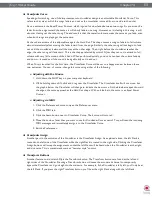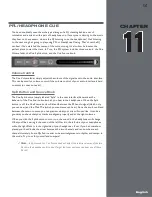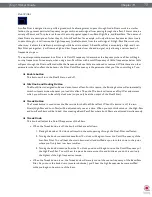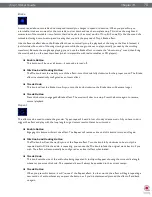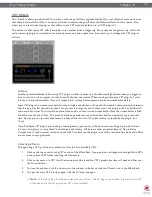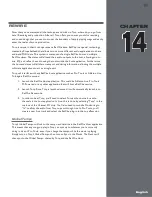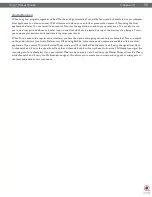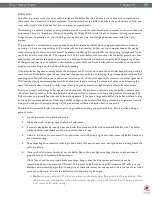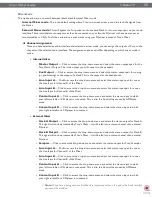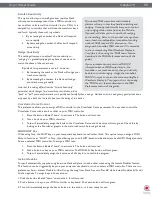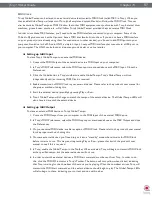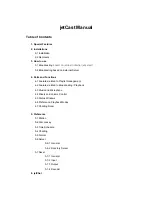
Torq 1.5 User Guide
Chapter 1
73
Torq 1.5 User Guide
Chapter 13
73
Dual-Filter
A coffee filter is designed to stop coffee grounds while allowing water to pass through. Audio filters work in a similar
fashion: they prevent particular frequency ranges within an audio signal from passing through the effect. Filters come in a
variety of flavors and Torq features three of the most popular types: Low-Pass, High-Pass, and Band-Pass. The names of
these filters are descriptive of what they do. A Low-Pass filter, for example, will only allow low frequencies (bass tones)
to pass through—it will remove the high-frequency (treble) content from the audio signal. A High-Pass filter works the
other way: it allows the treble to pass through while bass is removed. A Band-Pass filter is essentially a High- and Low-
Pass filter put together: it will remove high and low frequencies from the audio signal, only allowing a narrow band of
frequencies to pass.
The most important parameter for a filter is its Cutoff Frequency. It determines the frequency where a filter will begin
to stop frequencies. For example, when using a Low-Pass filter with a cutoff frequency of 1kHz, frequencies below 1kHz
will pass through the filter unaffected while the frequencies above 1kHz are reduced or removed. While there are other
parameters that also affect the behavior of a filter, Cutoff Frequency is the parameter that you’ll be controlling in Torq.
<
Enable button
This button will turn the Dual-Filter on and off.
<
Mix Knob and Routing Button
The Dual-Filter is designed to be used as an Insert effect. For this reason, the Routing button will automatically
switch to Insert mode whenever you load this effect. Then, the Mix knob will serve as a Dry/Wet adjustment
which you will want to leave fully clockwise (so you only hear the output of the Dual-Filter).
<
Tweak Button
The Tweak button is used to set the filter mode for the Dual-Filter effect. When this button is off, the two
filters (High-Pass and Low-Pass) will be adjusted only one at a time. When you turn this button on, the High-Pass
and Low-Pass filters will be linked, thus creating a Band-Pass filter where both filters are adjusted simultaneously.
<
Tweak Knob
This knob will adjust the Cutoff Frequencies of the filters.
» When the Tweak button is off, the knob will behave as follows:
1. Placing the knob at 12 o’clock will result in the audio passing through the Dual-Filter unaffected.
2. Turning the knob counterclockwise from 12 o’clock will begin to lower the Cutoff Frequency of the
Low-Pass filter. You will hear the music become dull and muffled as you turn this down to the point
where you’ll only hear low bass rumbles.
3. Turning the knob clockwise from the 12 o’clock position will begin to raise the Cutoff Frequency of
the High-Pass filter. You will hear the music become more thin and brittle as you do this until only
the highest of the high frequencies remain.
» When the Tweak button is on, the Tweak knob will merely control the center frequency of the Band-Pass
filter. As you turn the knob down (counterclockwise), you’ll hear the high frequencies become muffled
while you begin to hear more of the bass.
Summary of Contents for Torq 1.5
Page 1: ...user guide 1 5 ...





